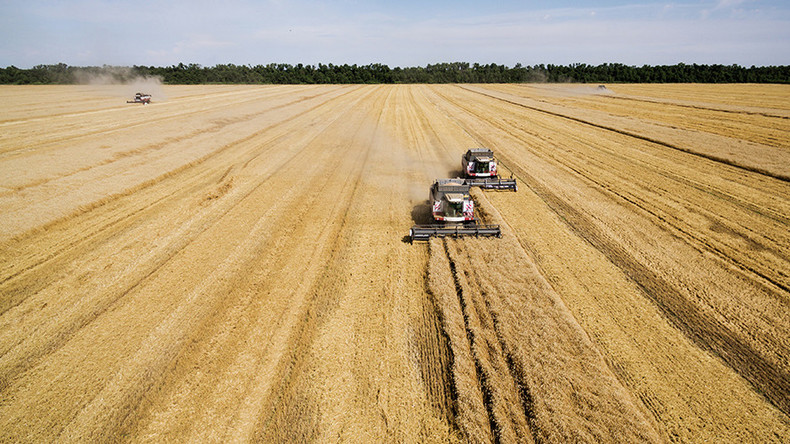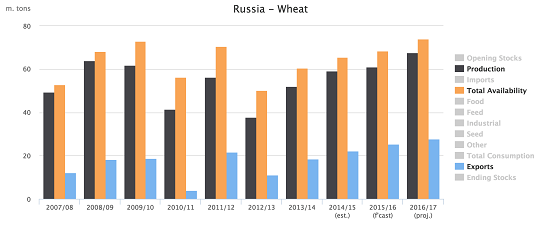Russia edges out US wheat
November 14, 2017 | Expert Insights

Russian Agriculture Minister Alexander Tkachev has revealed that Russia is beating the United States in grain market in 2017.
US’ status as an agricultural superpower is being challenged by Russia.
Background
Russian Federation is the successor state to the Soviet Union. Before its dissolution, Soviet Union and the US were the key factions in world politics. They were briefly allies during the World War II but by the end of the war, they had become hostile. Brewing mistrust was one of the main reasons for the Cold War. The end of Cold War and the dissolution of Soviet Union (as well as the creation of Russia) seemingly brought an end to a period of uncertainty and turmoil. Relations even improved between the two nations during the tenure of Russia's President Boris Yeltsin but it took a significant step back under Putin.
Relations between Russia and the US deteriorated in 2014 when Russia annexed Crimea. It cited a controversial referendum for doing so. As a result, Barack Obama and his EU allies unveiled a coordinated set of sanctions against Russia and ordered it to leave Crimea. Russia responded with counter-sanctions. Russia’s alleged interference in the US Presidential elections has further caused tensions in the ties.
US agricultural sector
The agricultural industry in the US is considered to be one of the most advanced sectors in the world. It is a major industry in the region and is a net exporter of food. As of the 2007 census of agriculture, there were 2.2 million farms, covering an area of 922 million acres (3,730,000 km2), an average of 418 acres (169 hectares) per farm. Although agricultural activity occurs in all states, it is particularly concentrated in the Great Plains.
The US has pioneered several agricultural techniques. The United States was a leader in seed improvement i.e. hybridization and in expanding uses for crops from the work of George Washington Carver to the development of bioplastics and biofuels.
Russian agricultural sector
Agriculture in Russia survived a severe transition decline in the early 1990s as it struggled to transform from a command economy to a market-oriented system. Following the breakup of the Soviet Union in 1991, large collective and state farms – the backbone of Soviet agriculture – had to contend with the sudden loss of state-guaranteed marketing and supply channels and a changing legal environment that created pressure for reorganization and restructuring. This negatively affected the farms and yield.

Analysis
In 2017, Russian agricultural sector, especially its grain sales have performed robustly. In fact, according to Russian Agriculture Minister Alexander Tkachev, Russia is beating the United States in grain sales. He said, “I think that American farmers are feeling under the weather amid the huge harvest in Russia, which will be about 130 mln tonnes. On some markets, we’ve pushed the Americans aside, and certainly, they are suffering losses, so we’re just overjoyed about this.”
The Wall Street Journal has reported that in 2017, Russian farmers are expected to harvest the biggest crop in over a century. Russia will produce at least 83 million tons of wheat in the current growing season.
“Today our task is to set reasonable prices across the country. The grain crop of 130 million tons, there is more to come. It may reach up to 200 million tons. The main thing is to find new sales markets,” said Tkachev.
Output in the US has meanwhile declined. In the face of terrible weather conditions, fewer acres of wheat were sowed in 2017. US wheat output will likely be reduced by 25% compared to the previous season.
Assessment
Our assessment is that US wheat in 2017 will only account for 15% of all global exports for the year. This is the lowest it has been in 40 years. This is largely due to robust performance by Russia as well as an increase of grain being grown in Europe and India. In order to offset their loss of position in the wheat market, US farmers have begun focusing in corn and soybean farming. However, it is clear that Russia has emerged as a direct challenger to US supremacy in more ways than one.








Comments